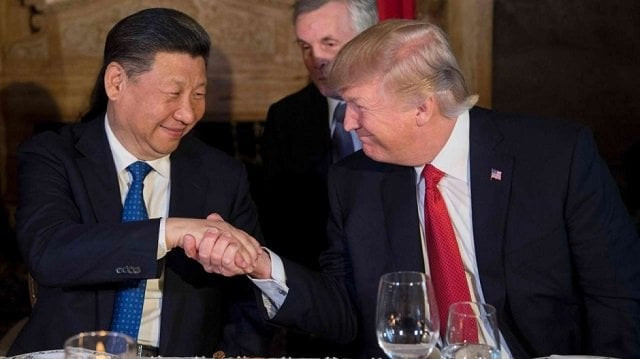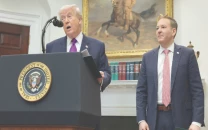Trump trade gambit tests 'friendship' with China's Xi
Xi has proven willing to go along with Trump when Chinese interests intersect, but no further

President Xi Jinping and President Donald Trump .PHOTO: AFP
China calls on US to 'cease and desist' from endangering trade relations
Since taking office in January 2017, the 71-year-old salesman-in-chief has boasted about his "great relationship" with world leaders, from Turkey's Recep Tayyip Erdogan to Russia's Vladimir Putin and Argentina's Mauricio Macri.
But perhaps the "greatest" relationship, the one most cherished by this newbie statesman, is the superpowered courtship with the most powerful Chinese leader since Mao.
After trashing China for all manner of trade transgressions, Trump veered off message Thursday to issue a telling caveat.
"I view them as a friend. I have tremendous respect for President Xi. We have a great relationship. They're helping us a lot in North Korea," he said. "And that's China."
Trump's wooing of Xi over chocolate cake at his Mar-a-Lago retreat in Florida, and his treatment of China as a peer -- effectively accepting Beijing's strategic desire for "Great Power Relations" between equals -- did not hurt the US drive to slap tough sanctions on North Korea.
Xi signed off on tougher UN measures -- a "favour" from Beijing that coincided with deepening Chinese concerns about Pyongyang's provocative weapons testing.
Tellingly, Xi has told interlocutors that he will not introduce the oil embargo that Trump has privately demanded, fearing the North Korean military -- and so the regime -- would collapse.
Xi has proven willing to go along with Trump when Chinese interests intersect, but no further. And experts dismiss the idea Xi cares very much for the "chemistry" beyond the opportunity it offers to further his own goals.
"Xi is not encumbered by sentimentality," said Ryan Hass, former National Security Council director for China. Trade may test that theory and would appear to be one clear point where Xi and Trump's interests diverge.
The economy has long been a security issue for Chinese leaders, who must create jobs at a clip to forestall social unrest.
Indeed, the threat of retaliation was swift -- Beijing on Friday unveiled a list of potential tariffs on $3 billion worth of US goods, from pork to fruits and wine, that it could impose.
According to Hass, Xi will respond "in a way that maximizes the impact of China's response on Trump's base of political support." In short, he will hit Trump where it hurts most.
But the seriousness of the feud may depend on what comes next, and if Trump's past form is anything to go by, the bite of these sanctions will be far less painful than the bark.
Again and again, his tough-sounding prime time announcements have been diligently watered down by staff operating off-screen and under real-world constraints.
Trump's much vaunted global steel tariffs have been followed by carve-outs for Australia, Brazil, Canada, Europe, Mexico, South Korea, New Zealand and others.
Trump may bristle, but for the most part has seemed happy to bet big while the cameras are rolling, before cutting his losses when the lights go out.
This time around, Trump's advisors had warned of the risks of sanctioning China, but pressed, they came up with a $30 billion sticker price.
That became $50 billion by the time it got to the Oval Office and, to the surprise of aides, it became $60 billion when Trump got in front of the cameras.
The true price will not be known for at least two weeks, when the US Trade Representative puts forward his final proposals.
"It is tempting to guess that the tariffs on Chinese imports will be ultimately as limited, but there is no way to know yet," said PNC Senior International Economist Bill Adams.
China's full response is likely to come only when that picture is fleshed out and even then will take into account the fact that the age of Trump has so far been good for business in Beijing and for Xi.
Having consolidated power more quickly than any Chinese leader since Deng Xiaoping, he recently secured a second term in office and removed limits on a third.
Trump's time in office has seen America in full retreat from Barack Obama's pivot to Asia, with the president questioning treaty alliances with Japan, South Korea and even Australia -- where officials report a stepped increase in Chinese pressure.
Trump poised to unveil China trade sanctions for theft of US intellectual property
Xi has also seen notably less push back from Trump over Chinese land grabs in the South China Sea, a gambit seen by Beijing as vital to project power and defending energy supply routes in the event of a military conflict.
His goal now is to guide the country through a "new era" of unrivalled global military and economic supremacy.
In the grand scheme of US-China relations, there may be much bigger forces at work than any one trade dispute, or any "friendship."



















COMMENTS
Comments are moderated and generally will be posted if they are on-topic and not abusive.
For more information, please see our Comments FAQ